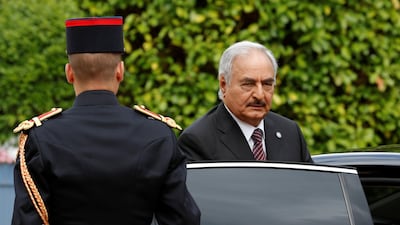Libyan National Army chief Field Marshal Khalifa Haftar has ordered naval units to confront Italian warships in territorial waters, a day after Rome launched a mission to counter migrant smuggling from Libya.
Naval bases in Tobruk, Benghazi, Ras Lanuf and Tripoli were to "confront any marine unit that enters Libyan waters without permission of the army", the LNA said.
The order was issued after an Italian naval support ship arrived in Tripoli on Wednesday to co-ordinate a campaign against migrant smugglers, with an Italian patrol boat due to follow in the coming days.
While the UN-backed Government of National Accord in Tripoli has supported the move, its rival House of Representatives parliament in eastern Libya, which controls the LNA, has opposed it.
The HOR called the arrival of Italian warships a “violation of sovereignty” and said Italy wanted to "export the illegal immigration crisis from its territory to Libya’s”.
The Tripoli naval base is under the control of the GNA and unlikely to follow the LNA command.
Italian patrol aircraft have also begun reconnaissance missions over western Libya, according to data from flight tracking sites. An Italian military radar site provided a link showing the path of one such flight, but there has been no official confirmation of these operations.
Diplomats say there is a low risk of armed confrontation, since the LNA operates in eastern and central Libya, while the migrant-smuggling area is from western ports under control of the GNA.
However, Field Marshal Haftar’s order raises tensions in Libya just a week after he agreed a peace plan with the GNA prime minister Fayez Al Sarraj in Paris. Although the plan called for a ceasefire, fighting continues in several parts of the country.
The civil war and lack of central government has seen Libya become the centre of migrant-smuggling to Europe. The UN has recorded more than 94,000 migrants crossing the Mediterranean to Italy so far this year, mostly from Libya, with 2,370 dying the attempt. The Rome government is under intense pressure from opposition parties to halt the flow.
Italy insists its naval craft will support Libyan naval units who will intercept migrant-smuggling craft close to Libya’s coast, and says there are no plans for Italian warships to take a direct role in the operation.
"There will be no harm done or slight given to Libyan sovereignty, because, if anything, our aim is to strengthen Libyan sovereignty,” Italian defence minister Roberta Pinotti told Italy’s parliament, which approved the naval deployment late on Wednesday.
The Italian action has revived memories among some Libyans of the country’s troubled colonial past. Italy controlled Libya from 1911 to 1943, fighting a series of bitter wars against Libyan resistance forces.
A poster of Omar Al Mukhtar, a resistance hero who fought the Italians in the 1920s, was hung near the main square in Tripoli with the inscription: “No to a return to colonisation”, Reuters reported.
In another move to stem the flow of migrants, Italy set conditions for rescue vessels to be allowed to ferry rescued migrants to its ports, including a provision that the craft that pick up the migrants take them to port themselves, rather than transfer them to other vessels at sea. The NGOs say the ship-to-ship transfers are needed to enable their vessels to remain off Libya and rescue more people.
On Tuesday Italian police seized a private ship operated by a German non-governmental organisation, Jugend Rettlet, after it docked at the Italian island of Lampedusa. The Iuventa is one of up to a dozen rescue ships that patrol outside Libyan territorial waters.
The ships are operated by eight NGOs, five of which, including Jugend Rettlet, have refused to sign the code of conduct, while the other three agreed.
Italian officials complain that these boats, funded by private contributions mostly from Europe, act as a “ferry service” to Italy for migrants, who are dispatched by smugglers in rubber and wooden boats and then picked up outside Libya’s 12-mile limit by the NGOs for transport to Sicily.
The NGOs insist they are performing a life-saving service, since the majority of the craft used by migrant-smugglers are not seaworthy.
On July 27 French president Emmanuel Macron proposed setting up migrant “hot spots” in Libya, where European Union officials could interview migrants to determine whether they qualify for political asylum.
Libyan officials expressed concern about Mr Macron’s plan, saying it would make Libya a magnet for migrants, and leave Libyans to deal with those migrants who failed to qualify for settlement in Europe.

